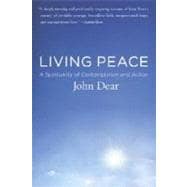
What is included with this book?
| Introduction | p. 1 |
| The Depths of Peace: The Inner Journey | |
| Making Peace with Yourself | p. 9 |
| Solitude | p. 18 |
| Silence | p. 26 |
| Listening | p. 31 |
| Letting Go | p. 38 |
| Imagining God | p. 45 |
| Intimate Prayer | p. 56 |
| Mindfulness | p. 62 |
| The Heights of Peace: The Public Journey | |
| The Vision of Peace | p. 69 |
| Choosing Peace | p. 74 |
| Active Nonviolence | p. 80 |
| Public Peacemaking | p. 92 |
| Speaking Truth | p. 100 |
| Live and Let Live | p. 110 |
| Resisting Evil | p. 119 |
| Standing with the Poor | p. 127 |
| Witnessing for Peace | p. 138 |
| Disarming the World | p. 146 |
| And Justice for All | p. 163 |
| Including Everyone | p. 170 |
| The Horizons of Peace | |
| Love Your Enemies | p. 181 |
| Building Community | p. 193 |
| Forgive Seventy Times Seven | p. 200 |
| Persistent Reconciliation | p. 207 |
| Hope upon Hope | p. 214 |
| Conclusion | p. 223 |
| Notes | p. 225 |
| Table of Contents provided by Syndetics. All Rights Reserved. |
The New copy of this book will include any supplemental materials advertised. Please check the title of the book to determine if it should include any access cards, study guides, lab manuals, CDs, etc.
The Used, Rental and eBook copies of this book are not guaranteed to include any supplemental materials. Typically, only the book itself is included. This is true even if the title states it includes any access cards, study guides, lab manuals, CDs, etc.
Excerpted from Living Peace: A Spirituality of Contemplation and Action by John Dear
All rights reserved by the original copyright owners. Excerpts are provided for display purposes only and may not be reproduced, reprinted or distributed without the written permission of the publisher.